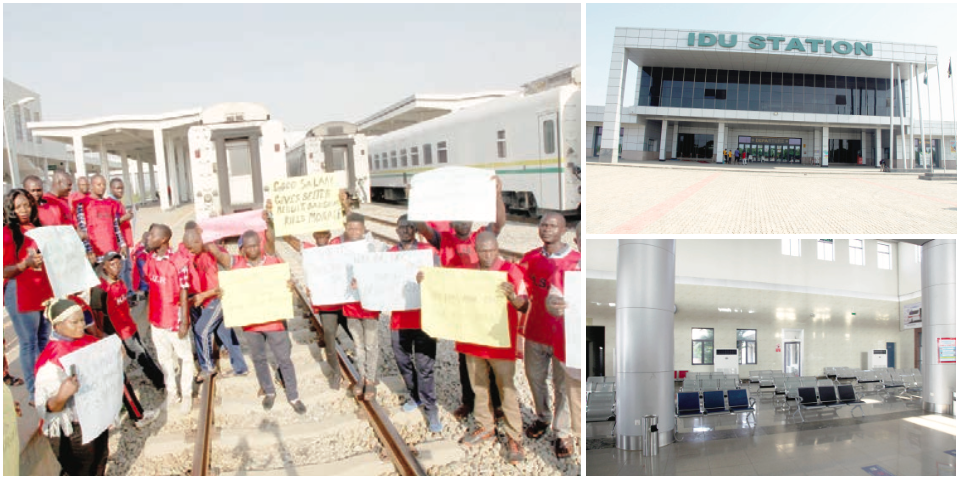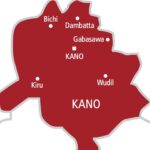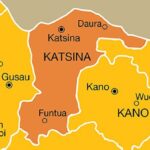The three-day warning strike embarked upon by workers of the Nigerian Railway Corporation (NRC) has grounded train services across the country.
Passengers for the Abuja-Kaduna train services; Lagos-Ibadan, among others, were stranded on Thursday as railway unions down tools to press home their demands for improved welfare.
The Nigerian Union of Railway Workers (NUR) and the Senior Staff Association (SSA) had jointly issued a statement saying the warning strike, which commenced yesterday will end on Saturday.
Officials of the unions said the ongoing strike action was to send a warning signal to the right quarters to heed their demands for improved welfare and standard condition of service.
They said their take-home pay was bad and needed an upward review. The unions said failure to address their grievances would be followed by protracted strike action.
Daily Trust reports that rising insecurity has recently made trains the preferred choice of transportation for many Nigerians especially from Abuja to Kaduna, Lagos to Ibadan, among others.
There are concerns that the corporation would lose millions of naira because of the strike.
How negotiations collapsed
The railway unions and the management of NRC had engaged in a series of meetings to avert the strike without reaching an agreement. Even the last week’s meeting with the Minister of Transportation, Rotimi Amaechi, was deadlocked, it was learnt.
Daily Trust observed that the Abuja-Kaduna train service was grounded as scores of passengers caught unaware were stranded at the Idu Train Station in the FCT. Many of them had to look for alternatives.
“I am not aware of the strike,” said Olayinka Joseph, a passenger. “I just came to the station to travel to Kaduna and discovered the railway staff were not working,” she said.
A Zaria-bound Ibrahim Audu was also frustrated.
“I took a taxi and paid N1, 500 to the train station but all the offices have been locked. It means I will spend another N2, 000 or more to go to the park in Jabi to begin to look for a vehicle to Kaduna,” he said.
Another passenger, Hassan Ismaila, said he would cancel his trip till Sunday when the staff would have resumed. He also said the NRC unions should learn how to publicise their strike well ahead of time so that passengers could be better informed.
“I prefer the Abuja-Kaduna train to cars because of the insecurity along the road,” Halima Ibrahim, who frequents the route, said.
“Honestly, it is too early for the railway workers to join other unions who believe a strike is the only option to press home their demands,” she said.
“Conversely, it means the government is not serious by allowing simple issues to degenerate to self-help. Remember, railway revitalisation is one of the showcase projects of this administration; they should take it seriously,” she said.
In Lagos, the protesting workers on Thursday shut the Mobolaji Johnson Train Station and other train services. The workers sang solidarity songs bearing placards reading, ‘Good salaries bring better results, bad salaries kill morale’; ‘Railway workers’ salaries least under the FMOT – (Federal Ministry of Transport)’, among others.
“Thousands of people who rely on rail transportation would arrive at our places of work very late,” Said Shakiru Ma’aruf.
“The train helps a lot and to a greater extent reduce the pressure on the roads occasioned by traffic gridlock. I am not happy those concerned allowed this to happen,” another passenger, Helen John, said.
General Secretary NUR, Comrade Segun Esan, said, “When you value the whole of the infrastructures, the whole of the assets in train service, starting from the locomotive, the coaches or the locomotive and the wagons, it is clearly over and above N2.5bn and the driver you are asking to drive such equipment is being paid a paltry amount as low and as so unbelievable as N26, 000, N30, 000, N36, 000 as the case may be! It doesn’t augur well.”
Daily Trust reports that the minimum wage in Nigeria is N30,000 and many wondered why NRC workers would be paid below that if the claim by the general secretary is true.
NRC may lose N100m
Meanwhile, the strike action will cost the NRC huge sums in economic losses daily. Checks by our correspondent showed that the NRC might lose over N57 million in the three days the strike action will last on the Abuja-Kaduna train service.
This paper estimated that it may lose up to N30m in the Lagos axis (Lagos-Ibadan and the intra-city train services) and about N13m on the Itakpe-Warri rail service.
The NRC will lose about N19m daily from its almost 5,000 daily passenger traffic on the Abuja-Kaduna corridor except on Wednesdays when it operates limited scheduled services due to maintenance programmes on the locomotives.
The NRC runs 12 coaches on the corridor using two Diesel Multiple Units (DMU) purposely for the express services. It operates up to eight trips on the corridor: four from Abuja and four from Kaduna. The economy coaches carry up to 88 passengers whilst the business class coaches carry up to 56 passengers.
The NRC charges N2, 600 per seat for the economy class (N3, 000 for express service) and N5, 000 for business class.
Cumulatively, it makes between N15m to N19m depending on the passenger traffic.
The in-train food vendors who make over N100, 000 daily would also lose while the about 100 cabs operating at the Idu Station alone could lose N1m daily.
The big losers apart from NRC would be the cab operators in Idu, Kubwa and Rigasa train stations which witness the largest traffic on the corridor.
Small businesses dealing in food vending, POS services, snacks, drinks and other small businesses will be counting losses without succour. Their potential losses could not be exactly established.
For the Lagos axis, the NRC would be losing an estimate of about N10m daily on the Lagos-Ibadan axis due to the strike embarked upon by railway workers.
In Lagos district where the NRC operates the newly launched Lagos-Ibadan standard gauge, the Lagos-Ogun intercity train services as well as the evacuation of cargoes from the port, the corporation is estimated to be losing over N10m daily. This is calculated on the estimated number of passengers on the services.
For the Lagos-Ibadan Train Service (LITS), about 1,000 passengers use the train daily and at an average of N2, 600 per passenger on the Economy Coach, NRC would lose N2.6m. For the intercity from Lagos to Ijoko, NRC conveys over 10,000 daily and at an N460 flat rate, it loses N5m daily.
We’re engaging unions – NRC
The Manager of the Abuja-Kaduna Train Service, Mr Pascal Nnorli, said the strike has crippled all train activities adding that the NRC management will further engage the unions to resolve the matter.
He also indicated that the matter might also involve the National Salaries, Wages and Income Commission, which has the constitutional power to review the work conditions of federal government workers.

 Join Daily Trust WhatsApp Community For Quick Access To News and Happenings Around You.
Join Daily Trust WhatsApp Community For Quick Access To News and Happenings Around You.


